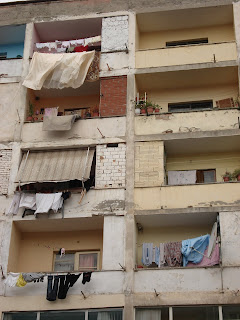
Actually it is simple--the turkey is the food of choice for all Albanians for New Year's dinner. And New Years is the biggest celebration of the year. Mothers cook all day, and in the late afternoon people gather as families to eat the products. At the center of the meal is the turkey.
The average pensioner in Albania receives the equivalent of $100 per month from the state as a "social security" payment. This is all many have to live on--and it is not easy. But the government also traditionally grants a New Year's Bonus--$50 per pensioner. And that just happens to be the average price of a turkey. So the pensioner can celebrate with everyone else...
Because of this tradition there has developed quite an industry of turkey raising in Albania, but unlike in many countries where such an industry would be mechanized and pursued on a grand scale, the industry is a home industry. Which gives rise to the profession of turkey-herding.

For several months before the New Year celebration, outside the capital one can see elderly men and women, young children, and others, in the fields or on the mountain slopes herding turkeys. With a stick in hand and perhaps a dozen birds in front, the herder watches his charge carefully. As evening comes the herder leads the turkeys into some kind of pen, only to lead them out in the morning. This ritual is repeated daily until a day or two after Christmas, when the turkeys are brought into the city, displayed in careful lines the market place, and sold.


New Years is celebrated around the world in different ways, and it is interesting to be in a new part of the world to see it celebrated here. But whatever the way it is celebrated there is a similarity. People look back on what is past--sometimes with joy, sometimes with sadness, and sometimes with regret. And people look forward to the future--sometimes with anticipation and sometimes with fear. And many people resolve to try to make what is coming better than what is past, they hope for new possibilities and new beginnings.
But accompanying all this, for those who believe in Christ, there should be another perspective on time, namely a recognition that the past, the present and the future are all gifts from God, to be reviewed and anticipated with that in mind as the New Year arrives. The challenge in this is to recognize the gift of time and to look backwards and forwards with our eyes on how we have used and can use it to the glory of God. That is really what time is for--and eternity for that matter! It is to be filled with the joy of serving the one who gives it to us.
My hope for all is that the New Year will be a time of serving, growing and coming to know better the one who gives us each moment of every day of every week of every month of every year. That is what will really make the year to come a Happy New Year!







































